Why You Need a Shopify Website Development Company for eCommerce Success
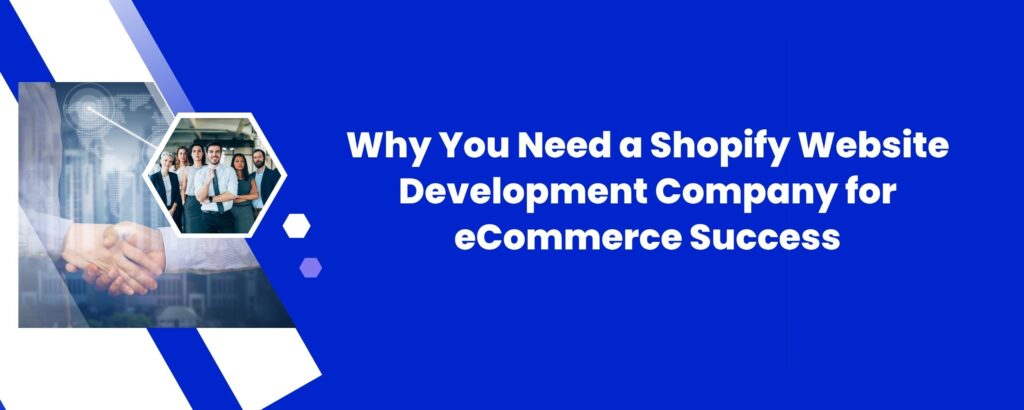
In the fast-paced world of online retail, your website is your most powerful business tool. With over 4 million businesses powered by Shopify, it’s no surprise that companies worldwide are turning to this platform to build and scale their eCommerce stores. But building a high-converting Shopify site requires more than just a template—it takes strategy, experience, and a skilled Shopify website development company to make your vision a reality. Whether you’re starting from scratch or revamping an existing store, hiring a dedicated development team can make a huge difference in performance, design, and profitability. Let’s explore why Shopify is a top choice, how expert developers can boost your success, and what to look for in a reliable Shopify partner. Why Shopify is the Go-To Platform for Online Stores Shopify has emerged as one of the most popular eCommerce platforms globally, and for good reason: User-Friendly Interface: Easily manageable even for non-tech users. Scalability: Perfect for both startups and large-scale enterprises. Secure and Reliable: 24/7 monitoring and SSL certification included. Extensive App Store: Integrate with tools for marketing, sales, inventory, and more. Custom Design Flexibility: Fully customizable with Liquid (Shopify’s templating language). But to fully leverage these benefits, businesses need expert support—something a professional Shopify website development company can deliver. The Importance of Hiring a Shopify Website Development Company While Shopify makes it simple to launch a store, creating a professional, high-performing website that converts requires expert input. Here’s how working with a Shopify development company can benefit your business: 1. Custom Design & Branding Generic themes might work for a basic store, but to stand out, you need a design that reflects your unique brand identity. Developers can customize every element to create a visually appealing and functional storefront. 2. Optimized User Experience (UX) A seamless browsing and shopping experience increases user retention and sales. Shopify experts optimize navigation, product pages, and checkout flows to reduce bounce rates and cart abandonment. 3. SEO-Friendly Development Technical SEO plays a vital role in online visibility. Professional developers ensure your store has clean code, fast load times, mobile responsiveness, and optimized meta tags—all essential for ranking on Google. 4. Third-Party App Integration From email marketing tools to inventory management systems, Shopify supports thousands of integrations. A skilled team can seamlessly connect your store to the tools you already use. 5. Ongoing Support and Maintenance Launching your store is just the beginning. A good Shopify website development company provides ongoing technical support, updates, and performance monitoring. Key Services Offered by Shopify Website Development Companies When selecting a Shopify development partner, make sure they offer a full suite of services, such as: Custom Shopify Theme Development Store Setup & Configuration Shopify App Integration Product & Inventory Management Payment Gateway Setup Migration from Other Platforms Performance Optimization Mobile Responsiveness Testing Conversion Rate Optimization (CRO) What to Look for in a Shopify Website Development Company Choosing the right development company can be a game-changer. Here are the key factors to consider: 1. Portfolio of Past Work Review their previous projects to see the quality, creativity, and functionality of their work. A diverse portfolio shows experience across different industries. 2. Client Reviews and Testimonials Positive feedback from past clients is a strong indicator of reliability and expertise. Look for reviews on platforms like Clutch, Google, or Upwork. 3. Certified Shopify Experts Shopify has a partner program that certifies skilled agencies and freelancers. A certified Shopify website development company is more likely to adhere to best practices and deliver quality results. 4. Transparent Pricing Make sure the company provides clear cost estimates without hidden charges. Look for packages that suit your business size and needs. 5. Post-Launch Support Your site will need updates, bug fixes, and possibly new features over time. Ensure the team offers long-term support or a maintenance plan. Trends in Shopify Website Development To stay competitive, your store needs to evolve with current trends. Here are some 2025 Shopify trends top development companies are implementing: AI-Powered Product Recommendations Voice Search Optimization Augmented Reality (AR) Product Previews One-Click Checkout Subscription-Based Store Models Custom Mobile-First Design Sustainable and Ethical Brand Messaging Why Shopify Website Development is a Long-Term Investment Investing in a custom-built Shopify store pays off in the long run. It not only helps you stand out from your competitors but also gives you more control over your marketing, sales, and user experience. Many businesses make the mistake of choosing quick, DIY solutions that limit scalability. A professional Shopify website development company ensures your site is built with future growth in mind. Conclusion In the competitive world of eCommerce, your website is your most powerful asset. Building a Shopify store that attracts, engages, and converts users takes more than just design—it requires strategic thinking and expert development. Hiring a professional Shopify website development company can set your business on the path to online success. From custom design and SEO optimization to ongoing support and scaling, expert developers ensure that your store doesn’t just look good but also performs exceptionally. Don’t settle for average. Elevate your online business with a professionally built Shopify store that delivers results.
Website Design in Pune: Your Gateway to a Strong Online Presence
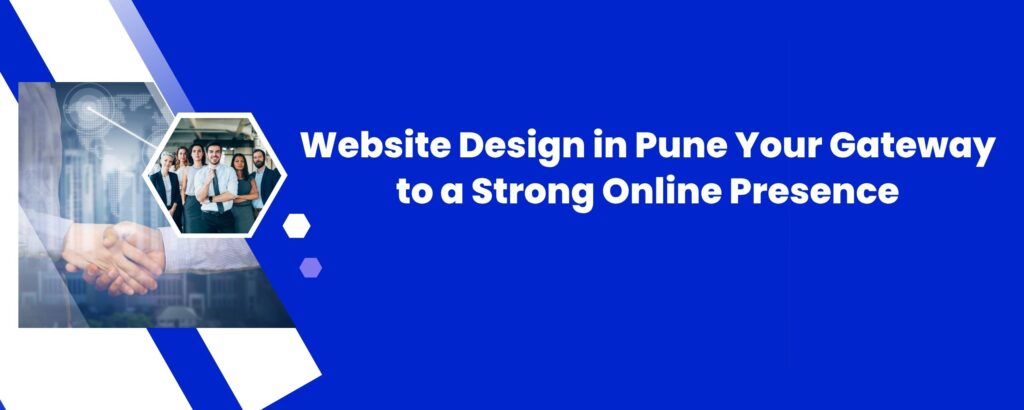
In a world where digital experiences define customer perception, your website is often your first and most lasting impression. Whether you’re a small business, a startup, or a growing enterprise, investing in professional website design in Pune can set you apart from the competition. Pune, being a tech-forward city, offers a thriving ecosystem of designers, developers, and digital strategists. However, the key to success lies in choosing a team that understands not just aesthetics but also user behavior, SEO principles, and responsive technology. Why Website Design in Pune Matters More Than Ever Your website is more than just an online brochure—it’s a strategic asset. Here’s why having a professional website design matters: 1. First Impressions Count Within seconds of landing on your website, users decide whether to stay or leave. A professionally designed website ensures your first impression is positive, trustworthy, and engaging. 2. Mobile Users Dominate Over 60% of web traffic comes from mobile devices. Responsive website design in Pune ensures your site looks great and functions smoothly on smartphones, tablets, and desktops alike. 3. SEO is Built-In A clean, well-structured site with optimized elements helps you rank higher on search engines. Designers who integrate SEO best practices into their work can give your business an edge. 4. Faster Load Times Slow websites lose visitors. By using optimized code, image compression, and the right hosting setup, designers can ensure your site loads quickly and keeps users engaged. What Makes Pune a Hub for Web Design? Pune is not just a cultural capital but also a growing tech hub. The city hosts a large number of IT professionals, creative agencies, and skilled freelancers. This makes website design in Pune highly competitive and innovative. Some reasons businesses prefer Pune-based designers: Cost-effective services without compromising on quality. Access to skilled talent including UI/UX experts, front-end developers, and SEO specialists. Flexible engagement models for startups, SMEs, and enterprise-level companies. Strong tech community that stays updated with design trends and technologies. Key Features of a High-Performing Website When hiring a team for website design in Pune, ensure your site includes the following features: 1. User-Friendly Navigation Users should be able to find information quickly and easily. Simple menus, clear CTAs, and intuitive layouts improve the overall user experience. 2. Visually Appealing Layout Design consistency, color harmony, and use of whitespace create a pleasant visual experience that keeps users coming back. 3. Content Management System (CMS) Modern websites are built on platforms like WordPress, Joomla, or Drupal, making it easy for you to update and manage content without technical skills. 4. SEO Optimization From fast loading speeds to proper meta tags, keyword usage, and structured content—SEO is built right into the design. 5. Security Measures SSL certificates, encrypted forms, and regular updates protect your site from cyber threats and build user trust. Choosing the Right Company for Website Design in Pune With countless agencies and freelancers offering web design services, how do you choose the right one? Here are some key factors to consider: 1. Check Their Portfolio Review their past projects to understand their design style and technical expertise. Look for diversity in industries and creative approach. 2. Read Client Reviews Client feedback is a reliable indicator of quality and professionalism. Look for reviews on Google, Clutch, or social media platforms. 3. Discuss Your Goals The right team will take time to understand your business objectives before proposing design solutions. 4. Evaluate Support and Maintenance Websites need regular updates. Choose a provider that offers reliable post-launch support and ongoing maintenance. The Process of Website Design in Pune Understanding the typical workflow can help you better collaborate with your design team: Requirement Gathering: Identify goals, audience, and features. Wireframing: Create rough layouts for user flow and page structure. Design Mockups: Visual designs are created based on branding and goals. Development: The site is built using HTML, CSS, CMS, or frameworks. Testing: Functional, compatibility, and performance testing is done. Launch: The site goes live after final approvals. Maintenance: Ongoing support ensures updates and security. How Website Design in Pune Helps You Grow Here’s how a professionally designed website impacts your business growth: Increases Online Visibility: Optimized for search engines and local discovery. Builds Credibility: A polished site signals professionalism and trust. Enhances Customer Experience: Easy-to-navigate and informative. Boosts Conversions: Strategic CTAs and layout elements lead to more inquiries and sales. Supports Digital Marketing: Integrated design helps with PPC, email campaigns, and social media efforts. Website Design Trends to Watch in 2025 Web design is an ever-evolving field. Leading designers in Pune are already adopting these trends: Minimalistic interfaces with bold typography. AI-driven personalization for better engagement. Interactive elements like scroll animations and hover effects. Dark mode designs to improve accessibility. Voice search optimization for better reach. Conclusion In an increasingly digital marketplace, your website is your brand’s most powerful tool. Investing in quality website design in Pune means more than just having a beautiful site—it means creating a platform that converts, engages, and grows with your business. From strategy to execution, the right design partner can turn your vision into a high-performing digital asset. Don’t leave your online presence to chance. Take the first step toward success by choosing professional website design services in Pune.
Choosing the Best Website Design Company in Pune: A Complete Guide
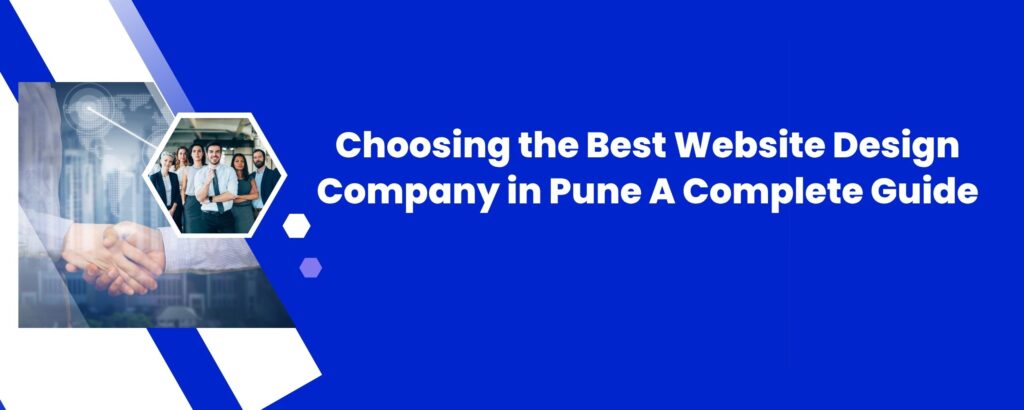
In today’s digital era, your website is the first impression of your brand. Whether you run a startup, an established business, or an e-commerce platform, having a professionally designed website is crucial. If you are looking to build a strong online presence, finding the right website design company in Pune can make all the difference. Pune, being a growing IT and business hub, has numerous companies offering web design services. However, choosing the best fit for your needs requires careful consideration. This blog will guide you through why a quality website design company in Pune matters, how to choose one, and what benefits you can expect. Why You Need a Professional Website Design Company in Pune Your website is often the first touchpoint customers have with your brand. A well-designed website can enhance user experience, increase customer engagement, and improve conversion rates. Here’s why hiring a professional website design company in Pune is beneficial: Expertise and Experience: Professional companies bring years of experience in creating websites tailored to business goals. Customized Solutions: They provide designs that align with your brand identity, target audience, and industry standards. SEO-Friendly Designs: Top website designers integrate SEO best practices to improve your visibility on search engines. Mobile Responsiveness: With mobile traffic on the rise, experts ensure your site works perfectly on all devices. Technical Support: Ongoing maintenance and support help keep your site updated and secure. Key Factors to Consider When Choosing a Website Design Company in Pune With many options available, you must evaluate each web design company carefully. Here are key aspects to keep in mind: 1. Portfolio and Past Work Always check the company’s portfolio to understand their style and quality of work. A diverse portfolio with successful projects across industries indicates versatility and capability. 2. Client Reviews and Testimonials Feedback from previous clients can provide insights into the company’s reliability, professionalism, and communication. 3. Range of Services Look for a company offering end-to-end solutions including UI/UX design, SEO optimization, content management system (CMS) integration, and digital marketing support. 4. Understanding Your Business Needs A great web design company will take time to understand your business objectives and target audience before proposing solutions. 5. Cost-Effectiveness While budget is important, don’t compromise quality for low costs. Choose a company that offers transparent pricing and delivers value. Benefits of Hiring a Local Website Design Company in Pune Opting for a local company in Pune has distinct advantages: Better Communication: Face-to-face meetings and local language support improve understanding and collaboration. Knowledge of Local Market: Local designers understand regional business culture and customer preferences. Quick Turnaround Time: Proximity allows for faster project completion and ongoing support. Supporting Local Economy: Working with local businesses fosters community growth. How a Website Design Company in Pune Boosts Your Business A skilled web design company goes beyond aesthetics to create a website that drives results. Here are some ways they can help: Improved User Experience Intuitive navigation, fast loading speed, and appealing layouts keep visitors engaged longer and reduce bounce rates. Enhanced SEO Performance By implementing SEO-friendly code, meta tags, and content structure, your site ranks higher on Google, attracting more organic traffic. Mobile-Friendly Design Responsive design ensures your site adapts seamlessly to smartphones and tablets, essential in today’s mobile-first world. Brand Credibility and Trust A professional website builds trust and credibility, encouraging visitors to choose your services over competitors. Increased Conversion Rates Clear calls-to-action (CTAs) and user-centric design elements guide visitors toward desired actions like purchases or inquiries. Popular Web Design Trends Adopted by Pune’s Leading Companies Keeping up with current web design trends is vital to stand out. Here are some trends Pune-based companies often use: Minimalist and clean designs Dark mode options Micro-interactions and animations Bold typography Voice user interface (VUI) integration AI-powered chatbots for instant support How to Get Started With a Website Design Company in Pune Ready to build or revamp your website? Follow these steps for a smooth process: Research: Identify potential website design companies in Pune. Consultation: Schedule discussions to explain your vision and expectations. Proposal and Quotation: Review their project plan and pricing. Design & Development: Collaborate on design drafts, provide feedback, and approve. Testing & Launch: Ensure the website functions flawlessly before going live. Maintenance: Arrange ongoing updates and technical support. Conclusion Choosing the right website design company in Pune is a strategic decision that can significantly impact your business growth. With the right partner, you gain a website that not only looks great but also performs exceptionally well, attracting and converting visitors effectively. Take time to research, ask the right questions, and invest in quality design services that align with your goals. Start your journey towards a powerful online presence today with a trusted website design company in Pune!
Best Social Media Marketing Company in Pune: Elevate Your Brand Online
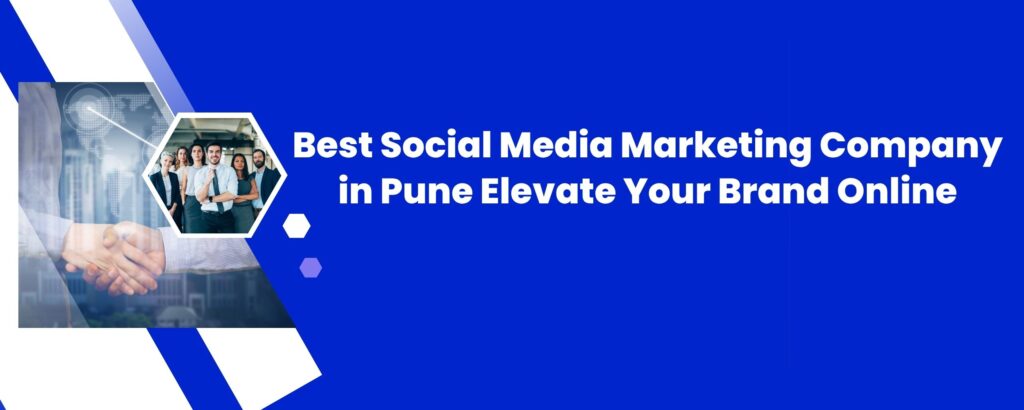
In today’s digital age, social media marketing is no longer optional—it’s a necessity. Businesses that harness the power of social media not only reach wider audiences but also build meaningful connections with customers. For companies based in Pune aiming to boost their online presence, partnering with the Best Social Media Marketing Company in Pune can make all the difference. This blog explores why social media marketing is crucial, what to look for in a top agency, and how the Best Social Media Marketing Company in Pune can help your business thrive. Why Social Media Marketing is Crucial for Businesses in Pune Social media platforms like Facebook, Instagram, LinkedIn, and Twitter offer unmatched opportunities to engage customers directly. With Pune’s growing entrepreneurial ecosystem and tech-savvy population, digital marketing is becoming the cornerstone of business growth. Here’s why social media marketing matters: Brand Visibility: Social media allows brands to get noticed by thousands—even millions—of potential customers. Customer Engagement: Platforms enable two-way communication, building trust and loyalty. Cost-Effective Marketing: Compared to traditional advertising, social media campaigns offer better ROI. Targeted Advertising: Advanced targeting options let businesses reach specific demographics based on location, interests, and behavior. Measurable Results: Analytics tools track campaign performance to optimize efforts continuously. What Defines the Best Social Media Marketing Company in Pune? Not all agencies are created equal. When searching for the Best Social Media Marketing Company in Pune, consider the following qualities: 1. Proven Track Record A leading company should showcase successful campaigns and satisfied clients. Look for case studies, testimonials, and client retention rates. 2. Customized Strategies Every business is unique. The best agency develops tailored social media strategies aligned with your goals, audience, and industry. 3. Comprehensive Services From content creation and community management to paid advertising and analytics, a full-service agency covers all bases. 4. Up-to-Date with Trends Social media is ever-changing. The top agencies stay ahead of platform updates, algorithm changes, and emerging trends. 5. Transparent Reporting Regular, easy-to-understand reports ensure you’re always informed about your campaign’s progress and ROI. Services Offered by the Best Social Media Marketing Company in Pune Partnering with the best means gaining access to a wide range of expert services: Social Media Strategy Development Experts analyze your market, competition, and audience to create a winning plan. Content Creation and Management Compelling visuals, videos, and posts that resonate with your audience. Paid Social Advertising Targeted ads on Facebook, Instagram, LinkedIn, and more to boost reach and conversions. Influencer Marketing Collaborations with local influencers to amplify your brand message. Social Media Monitoring and Analytics Tracking performance metrics and adjusting strategies for continuous improvement. How the Best Social Media Marketing Company in Pune Can Benefit Your Business Boost Brand Awareness A strong social media presence introduces your brand to new audiences and builds credibility. Generate Quality Leads Targeted campaigns attract users genuinely interested in your products or services. Enhance Customer Relationships Consistent engagement fosters loyalty and encourages repeat business. Stay Competitive With expert guidance, you can keep pace with industry changes and outshine competitors. Maximize ROI Data-driven strategies ensure your marketing budget is spent effectively. Why Choose a Local Company in Pune? While many agencies operate nationally or internationally, a local company understands Pune’s market dynamics better. They’re familiar with regional preferences, language nuances, and cultural trends that impact social media behavior. Choosing the Best Social Media Marketing Company in Pune means working with a team that can craft locally relevant campaigns with global standards. Client Success Stories: Real Results from Pune Businesses Many Pune-based businesses have transformed their digital presence by collaborating with expert social media marketers. From startups to established enterprises, success stories often include: Significant increases in follower counts and engagement rates. Higher website traffic driven by social media referrals. Improved conversion rates through targeted ad campaigns. Enhanced brand reputation and customer satisfaction. How to Get Started with the Best Social Media Marketing Company in Pune Taking the first step is easy: Reach Out for a Consultation: Discuss your business goals and current social media status. Audit Your Current Social Media: Get a detailed analysis of what’s working and what needs improvement. Create a Customized Plan: Collaborate on a strategy tailored to your business needs. Launch and Monitor Campaigns: Watch your online presence grow with expert management. Review and Optimize: Regular updates and optimizations keep your campaigns effective. Conclusion If you want to thrive in Pune’s competitive business landscape, partnering with the Best Social Media Marketing Company in Pune is key. With expert guidance, innovative strategies, and ongoing support, you can elevate your brand’s online presence, engage your audience effectively, and achieve measurable growth. Ready to Take Your Social Media Marketing to the Next Level? Don’t wait to unlock your brand’s full potential. Contact the Best Social Media Marketing Company in Pune today and get a free consultation tailored to your business goals. 👉 Boost your online presence now—reach out for a free social media audit and start growing smarter!
Top 5 Business Growth Metrics to Track Now for Success
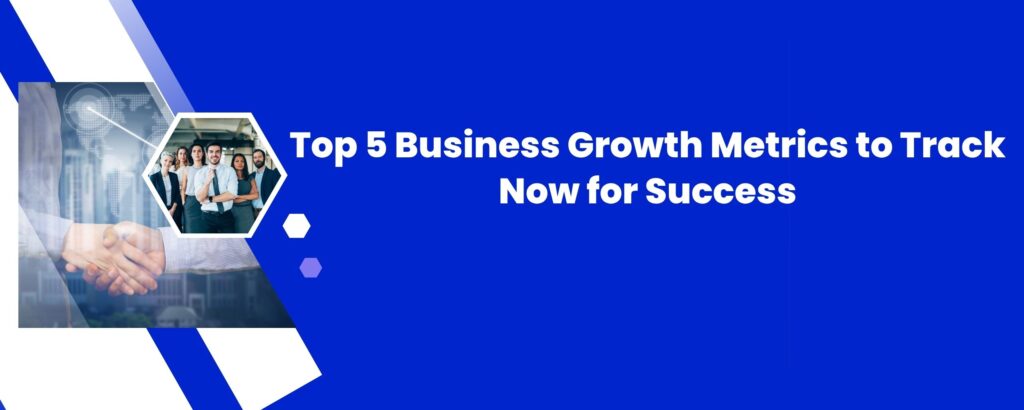
In today’s fast-paced business world, understanding the Top 5 Business Growth Metrics to Track Now is essential for staying competitive. Without these key performance indicators, businesses can’t make informed decisions or spot trends early enough to act. Knowing which metrics to focus on can mean the difference between scaling successfully or stagnating. Why Tracking Business Growth Metrics Matters Tracking growth metrics provides a clear snapshot of your business’s progress and potential challenges. It helps you: Identify strengths and weaknesses Make data-driven decisions Forecast future performance accurately Align team efforts around measurable goals Increase investor confidence with transparent reporting By focusing on the right metrics, you ensure you’re not just growing but growing sustainably and profitably. Top 5 Business Growth Metrics to Track Now 1. Customer Acquisition Cost (CAC) CAC measures how much you spend to acquire a new customer. It includes marketing expenses, sales team costs, and onboarding fees. Why track CAC?A rising CAC can indicate inefficient marketing or sales strategies. Ideally, your CAC should be lower than the lifetime value of your customers to maintain profitability. How to calculate CAC:Total Sales and Marketing Expenses ÷ Number of New Customers Acquired Monitoring CAC regularly lets you optimize campaigns and channels, ensuring you get the best return on your marketing investment. 2. Customer Lifetime Value (CLV or LTV) CLV estimates the total revenue a single customer will generate during their relationship with your business. This metric helps you understand how valuable your customers truly are over time. Why is CLV important?Tracking CLV alongside CAC ensures you’re spending wisely on customer acquisition. It also informs your retention strategies and product development. How to calculate CLV:Average Purchase Value × Purchase Frequency × Average Customer Lifespan Increasing CLV means your customers keep coming back, spending more, and referring others — all vital signs of healthy growth. 3. Monthly Recurring Revenue (MRR) MRR is the predictable revenue your business earns every month from subscriptions or recurring purchases. For SaaS companies and subscription-based models, MRR is critical. Why focus on MRR?It provides a consistent measure of revenue growth and helps forecast future earnings. MRR also reflects customer retention and upselling success. How to calculate MRR:Sum of monthly subscription fees from all active customers Tracking MRR closely allows you to spot trends early and pivot strategies before revenue dips. 4. Churn Rate Churn rate measures the percentage of customers or revenue lost over a specific period. High churn can undermine growth by eroding your customer base. Why is churn rate vital?Lower churn means better customer satisfaction and long-term revenue. If churn spikes, it’s a warning sign to improve customer service, product quality, or engagement. How to calculate churn rate:(Number of customers lost during a period ÷ Total customers at the start of that period) × 100 Understanding churn helps you prioritize retention efforts and increase overall business stability. 5. Gross Profit Margin Gross profit margin shows how much profit you make after subtracting the cost of goods sold (COGS). It indicates the financial health of your core business operations. Why monitor gross profit margin?A healthy margin means your pricing and cost control strategies are effective. If margins shrink, you may need to reduce costs or increase prices to maintain profitability. How to calculate gross profit margin:(Gross Profit ÷ Revenue) × 100 Keeping an eye on this metric ensures your growth is financially sustainable and not just top-line expansion. How to Use These Metrics Effectively Simply tracking metrics isn’t enough; you must analyze and act on them: Set Benchmarks: Compare your metrics against industry standards to understand where you stand. Segment Data: Break down metrics by customer segment, product line, or geography to uncover hidden insights. Use Dashboards: Implement analytics tools to visualize metrics in real-time. Regular Reviews: Schedule monthly or quarterly reviews to assess trends and make adjustments. Align Teams: Share metrics company-wide to foster accountability and data-driven culture. Common Mistakes When Tracking Business Growth Metrics Tracking Too Many Metrics: Focus on key metrics that directly impact your goals. Ignoring Context: Metrics need to be interpreted alongside business conditions and market trends. Delaying Action: Data is only valuable if it informs timely decisions. Poor Data Quality: Ensure your data is accurate and consistent by using reliable tools and processes. Final Thoughts If you want to grow your business successfully, knowing and tracking the Top 5 Business Growth Metrics to Track Now is a must. These metrics give you a holistic view of your customer acquisition costs, revenue health, retention, and profitability. By keeping a close watch on these KPIs, you can make smarter decisions, identify opportunities earlier, and ensure your growth is both rapid and sustainable. Ready to Take Your Business Growth to the Next Level? Tracking metrics can be complex—but you don’t have to do it alone. Our team specializes in helping businesses identify the right growth indicators and turn data into action. 👉 Contact us today for a free consultation and start growing smarter with clear, actionable insights! Summary: Customer Acquisition Cost helps you understand acquisition efficiency. Customer Lifetime Value reveals the long-term value of customers. Monthly Recurring Revenue shows predictable, recurring income. Churn Rate alerts you to customer loss and retention issues. Gross Profit Margin ensures your core business remains profitable. Track these metrics consistently to build a thriving, sustainable business.
Magento to Shopify Migration: A Complete Guide to a Smooth Transition
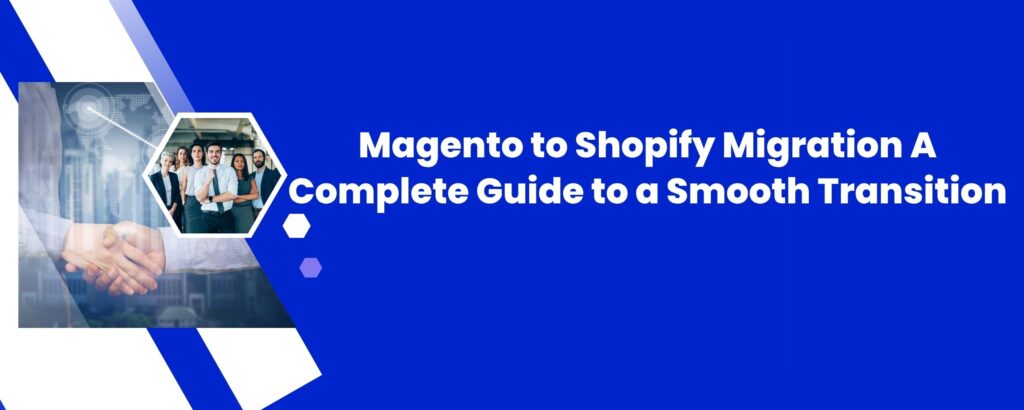
E-commerce platforms are the foundation of any online retail business. Over time, as businesses grow and customer expectations evolve, the platform that once served your needs might start showing limitations. Many online merchants today are choosing to migrate from Magento to Shopify—and for good reason. In this blog post, we’ll explore why this transition is gaining momentum, what steps are involved, and how to ensure a seamless switch that enhances your store’s performance, usability, and sales. Why Switch from Magento to Shopify? Magento has long been a trusted e-commerce platform, offering extensive customization and control. However, it often requires ongoing development resources, regular maintenance, and server management, making it less ideal for non-technical business owners. On the other hand, Shopify has emerged as a powerful alternative—an all-in-one hosted solution that is user-friendly, scalable, and secure. Here’s why businesses are making the switch: Ease of Use: Shopify’s drag-and-drop builder and intuitive admin interface simplify day-to-day operations. Lower Maintenance: With Shopify hosting the platform, you don’t need to worry about server upkeep or security patches. Mobile Optimization: Shopify themes are mobile-friendly out of the box. App Ecosystem: A vast library of apps helps extend functionality without custom coding. Scalability: Whether you’re a startup or a growing enterprise, Shopify scales with your business. Key Considerations Before Migrating Before moving from Magento to Shopify, it’s essential to plan the process thoroughly. Here are some aspects to keep in mind: 1. Understand Feature Differences Magento allows deep customization, while Shopify focuses on ease and speed. Review your existing features and decide what’s essential to replicate or improve. 2. Inventory and Data Structure Ensure your product data, customer records, order history, and URLs are all backed up and formatted correctly for migration. 3. SEO and URL Redirection One of the most critical aspects of migration is preserving your SEO rankings. Plan for 301 redirects, metadata transfer, and keeping high-performing URLs consistent. 4. Third-Party Integrations Review your existing integrations (payment gateways, CRMs, ERP, etc.) and confirm they are available or compatible in Shopify’s app ecosystem. Step-by-Step Guide to Magento to Shopify Migration Step 1: Backup Your Magento Store Before doing anything, create a full backup of your Magento store, including the database, files, media, and theme configurations. Step 2: Set Up Your Shopify Store Create a Shopify account and set up the basic store settings, including currency, tax rates, shipping zones, and payment methods. Step 3: Migrate Your Data Use a trusted migration tool or hire an expert to move essential data such as: Products (including images, descriptions, and SKUs) Customer data Order history Categories and collections Reviews and blog content (if applicable) Many businesses use tools like LitExtension, Cart2Cart, or Shopify’s native import tool. Step 4: Choose a Shopify Theme Select a theme that matches or improves upon your current store design. Shopify’s theme store offers both free and paid options optimized for performance and mobile responsiveness. Step 5: Customize and Test Your Store Adjust colors, layouts, and settings to match your brand identity. Then, conduct thorough testing: Check product pages and category layouts Test cart and checkout functionality Verify email notifications Validate mobile responsiveness Step 6: Set Up 301 Redirects To maintain your SEO rankings, set up 301 redirects from your old Magento URLs to the new Shopify URLs. This ensures both search engines and returning users can still find your content. Step 7: Launch Your New Shopify Store After final testing, go live with your new Shopify store. Monitor performance closely in the days following the launch to quickly fix any unexpected issues. Post-Migration Tips Monitor Analytics: Track user behavior, bounce rates, and conversion rates to identify areas for improvement. Collect Customer Feedback: Ask your loyal customers what they think of the new site layout and experience. Leverage Shopify Apps: Explore apps that automate marketing, inventory management, and customer support. Continue SEO Efforts: Create fresh content and optimize your product pages to maintain or improve rankings. Common Challenges During Migration (and How to Solve Them) Data Loss or Corruption: Always use reliable tools and create backups before transferring. SEO Ranking Drops: Implement 301 redirects, maintain metadata, and monitor Google Search Console. Broken Links: Use link checker tools post-launch to ensure a smooth user experience. Theme Limitations: While Shopify is more streamlined, some advanced customizations may require a Shopify developer. Magento to Shopify: Is It Worth It? Absolutely. For most businesses, the benefits of switching from Magento to Shopify far outweigh the temporary inconvenience of migrating. The reduced technical burden, increased reliability, and enhanced user experience allow business owners to focus more on growing their store and less on platform maintenance. Moreover, Shopify’s strong ecosystem of apps, partners, and support resources makes it a long-term solution for growing e-commerce brands. Final Thoughts Migrating from Magento to Shopify can be a game-changing move for your business—if done right. With careful planning, the right tools, and expert support, you can make the transition seamless while preserving your store’s integrity, SEO performance, and customer trust. It’s not just a platform switch; it’s a strategic upgrade that empowers your brand to scale faster, deliver better user experiences, and stay ahead in a competitive market. 🚀 Ready to Migrate from Magento to Shopify? Let us handle your migration professionally, with zero downtime and full data integrity. Whether you’re looking for a fresh start or just tired of the tech headaches, we’re here to help. 👉 Get your FREE Magento to Shopify migration consultation today!Start the transition the right way—seamless, secure, and stress-free. Summary at a Glance: Shopify offers a user-friendly, scalable alternative to Magento. Plan your migration with a detailed step-by-step strategy. Preserve SEO with redirects and optimized content. Leverage Shopify’s tools and apps for post-migration growth. Seek expert help for a smooth, professional migration experience.
Business SEO Solutions: Unlocking Growth and Visibility in the Digital Ag
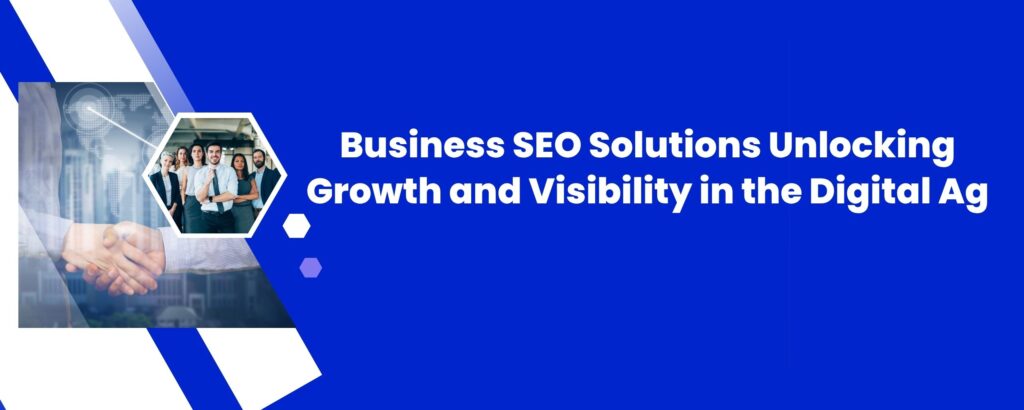
In today’s highly competitive online marketplace, having a stunning website is not enough. If your business is not showing up in search engine results, you’re losing out on valuable leads, sales, and visibility. That’s where Business SEO Solutions come into play. These solutions are not just technical tactics; they’re strategic tools that help brands thrive online. In this blog, we’ll explore what Business SEO Solutions entail, why they’re critical for success, and how you can implement them to elevate your online presence. What Are Business SEO Solutions? Business SEO Solutions refer to a suite of strategies and practices designed to optimize a business’s online presence for search engines like Google, Bing, and Yahoo. These solutions include: Keyword research and targeting On-page SEO optimization Content creation and marketing Link building strategies Technical SEO improvements Local SEO for region-specific businesses Analytics and performance monitoring Whether you’re a small local shop or a large enterprise, implementing tailored SEO strategies can significantly impact your digital growth and ROI. Why Are SEO Solutions Important for Businesses? Increased Visibility and Organic TrafficSEO helps your website appear in front of users actively searching for your products or services. This organic traffic is not only cost-effective but also highly targeted. Builds Trust and CredibilityWebsites that rank higher are generally perceived as more trustworthy. SEO helps build authority through quality content, backlinks, and improved user experience. Improves User Experience (UX)Good SEO goes hand-in-hand with a great user experience. Faster load times, mobile responsiveness, and easy navigation improve engagement and reduce bounce rates. Higher ROI Compared to Paid AdsWhile pay-per-click advertising offers quick results, SEO builds a long-term foundation for sustained visibility. Once established, you’ll reap continuous benefits without paying for every click. Core Components of Effective Business SEO Solutions 1. Keyword Strategy Development Effective SEO begins with identifying the right keywords that your potential customers are using. This includes long-tail keywords, buyer-intent phrases, and niche-specific search terms. These should naturally be woven into your website’s content, meta descriptions, and headers. 2. Content Marketing for Authority Creating high-quality, valuable content positions your business as an expert in your industry. Blog posts, infographics, videos, and case studies help you address customer pain points while optimizing for search engines. 3. On-Page SEO Optimization From title tags to image alt-text, on-page SEO ensures every element of your website is fine-tuned for both search engines and users. Internal linking and proper content structure also play vital roles in enhancing page relevance. 4. Technical SEO Enhancements Technical SEO ensures that search engines can crawl and index your website efficiently. Elements like site speed, XML sitemaps, structured data, and mobile-friendliness are crucial for improved rankings. 5. Backlink Building Quality backlinks from authoritative websites boost your credibility in the eyes of search engines. An effective backlink strategy can involve guest posting, outreach campaigns, and listing your business in trusted directories. 6. Local SEO for Location-Based Visibility If you run a local business, optimizing for local SEO is crucial. This includes claiming your Google My Business profile, collecting positive reviews, and ensuring consistent NAP (Name, Address, Phone) across directories. Choosing the Right Business SEO Solutions Provider With so many agencies and freelancers offering SEO services, choosing the right partner can be overwhelming. Here are key criteria to consider: Proven Track Record: Ask for case studies or examples of past success. Transparent Reporting: Ensure they provide clear analytics and regular updates. Custom Strategy: Avoid one-size-fits-all approaches. Your business is unique and so should be your SEO plan. White-Hat Practices: Stay away from black-hat tactics that might get you penalized by search engines. Common Mistakes to Avoid in Business SEO Ignoring mobile optimization Focusing only on short-term gains Stuffing keywords unnaturally Skipping competitor analysis Forgetting about user experience Avoiding these pitfalls is as important as implementing the right strategies. The Future of SEO: What Businesses Need to Know As search engines evolve, so do SEO tactics. Voice search, AI-driven algorithms, and semantic search are shaping the future. Businesses must stay ahead of the curve by constantly updating their SEO strategies and embracing new technologies. For instance, optimizing for featured snippets and integrating conversational keywords are becoming increasingly important. Investing in Business SEO Solutions today means preparing for tomorrow’s digital landscape. Final Thoughts: Your Roadmap to Success Your competitors are likely investing in SEO. If you’re not, you’re giving them a free advantage. Comprehensive Business SEO Solutions are essential to outsmart the competition, build credibility, and grow sustainably online. Whether you’re just starting out or looking to refine your digital strategy, now is the perfect time to harness the power of SEO. With a well-executed plan, you can attract more leads, convert more customers, and build a brand that stands out. Ready to Elevate Your Online Presence? Don’t let your business get lost in the digital crowd. Partner with our expert team and discover tailored Business SEO Solutions that drive real results. Contact us today for a free SEO audit and start your journey toward measurable growth. 👉 [Schedule Your Free Consultation Now] ✅ Blog Summary Business SEO Solutions are essential for visibility, growth, and ROI. Key components include content strategy, technical optimization, and local SEO. A reliable SEO provider customizes strategies based on your unique needs. Avoid common mistakes and prepare for future SEO trends. Take action now with a free consultation to improve your online presence.
Ultimate Guide to React UI Component Libraries

Best React UI Libraries for Fast and Beautiful Web Development React has become a leading framework for building modern web applications, and one of its biggest advantages is the rich ecosystem of UI component libraries. These libraries help developers build responsive, consistent, and user-friendly interfaces without reinventing the wheel. When you choose from the best React UI libraries, you’re not just saving development time—you’re also ensuring your app has a polished look and feel. Many of these libraries offer pre-designed components such as buttons, modals, tables, form inputs, and even complex elements like date pickers or drag-and-drop interfaces. With built-in accessibility and responsive design, they can drastically improve both development efficiency and user experience. Some popular choices include Material UI, Chakra UI, Ant Design, and Tailwind UI (with Headless UI). Each library brings something unique. For example, Material UI is inspired by Google’s Material Design system and is widely adopted across enterprise-level applications. Chakra UI offers a more flexible and developer-friendly approach with its style props and theming capabilities. Ant Design, created by Alibaba, shines with its extensive component set and robust form system, ideal for data-heavy applications. When selecting the best React UI libraries, consider your project’s needs. Is theming important? Do you need mobile-first design? Are you prioritizing accessibility or want components with minimal styling so you can fully customize them? Your answers will guide you toward the most suitable library. Using these libraries not only accelerates the development process but also promotes consistency across your application. Most are open-source and supported by active communities, which ensures regular updates and improvements. In conclusion, whether you’re building a startup MVP, a large-scale admin dashboard, or an e-commerce storefront, leveraging the best React UI libraries can give you a significant head start. They minimize repetitive tasks and let you focus more on delivering value to your users.
Step-by-Step Guide to .NET Transactional Data Handling
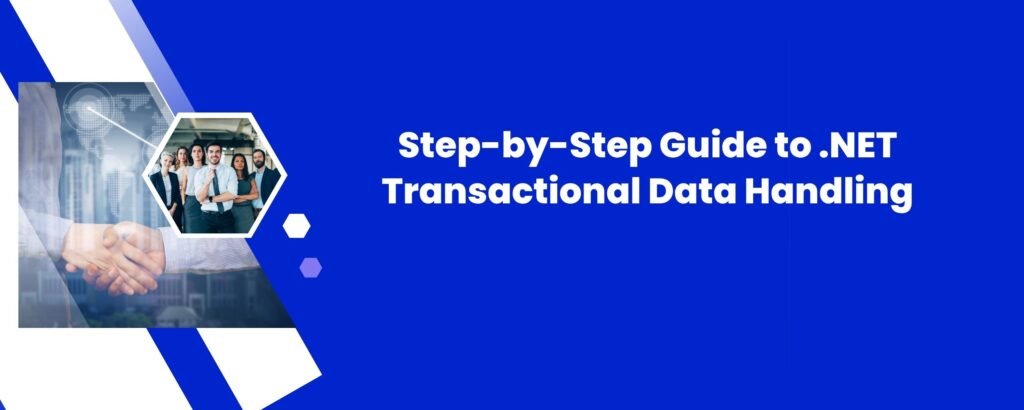
NET Transactional Data Handling: Ensuring Reliable Data Operations In modern software development, especially in enterprise-level applications, .NET transactional data handling plays a vital role in maintaining data consistency and integrity. When multiple operations interact with a database, there’s always a risk of partial updates or failures. Transactional handling ensures that a group of operations is executed as a single unit—commonly known as an atomic transaction. If one step fails, the entire transaction rolls back, preventing data corruption. Using tools like Entity Framework, developers can easily implement .NET transactional data handling with built-in support for transactions. This is particularly useful in scenarios like banking, order processing, and inventory management, where a failed operation must not leave the database in an inconsistent state. For example, transferring funds between accounts must either debit one account and credit the other—or do nothing at all. One of the core principles of transactional systems is ACID compliance—Atomicity, Consistency, Isolation, and Durability. The .NET framework, combined with SQL Server or any compatible database, supports these properties natively. Developers can create transaction scopes using classes like TransactionScope or through DbContext in Entity Framework, which makes it easy to commit or roll back changes based on the operation’s success. When handling multiple updates across tables or services, transactional data handling becomes even more critical. It not only simplifies error management but also improves system reliability. For example, in an e-commerce system, placing an order might involve updating inventory, logging the transaction, and notifying the user. If one step fails and transactions are not managed, you might end up with mismatched stock data or incomplete records. By integrating .NET transactional data handling into your application logic, you ensure your operations are safe, reversible, and reliable. This contributes to a smoother user experience, higher trust, and fewer data anomalies in production systems. In conclusion, whether you’re developing a simple CRUD application or a complex enterprise platform, mastering transactional handling in .NET is essential. With support from Entity Framework, you can implement robust, ACID-compliant logic that keeps your database operations safe and consistent.
The Ultimate Guide to Choosing the Right React UI Library for Your Project

In the fast-paced world of front-end development, creating user interfaces that are both aesthetically pleasing and functionally efficient is crucial. With React leading the charge as one of the most popular JavaScript libraries for building user interfaces, developers often find themselves searching for the perfect React UI library to speed up development and maintain consistency across projects. But with so many options available, how do you choose the right one? This guide will explore what a React UI library offers, how to pick the best one for your project, and what features truly matter. What Is a React UI Library? A React UI library is a collection of pre-designed, reusable components built using React. These components can include everything from buttons, modals, forms, and tables to complex design systems that integrate themes and accessibility by default. These libraries help developers save time, reduce bugs, and ensure a consistent user experience across applications. Whether you’re building a simple dashboard or a full-scale enterprise application, using a React UI library streamlines your workflow and enhances scalability. Why Use a React UI Library? Here are several compelling reasons to adopt a React UI library in your next project: 1. Accelerated Development Pre-built components mean you can focus on business logic instead of UI details. No need to reinvent the wheel. 2. Consistency Design and functionality remain uniform across all parts of your application, which is particularly beneficial for large teams or long-term projects. 3. Accessibility Many popular libraries come with ARIA roles and keyboard navigation out of the box, ensuring better accessibility compliance. 4. Customization Most libraries offer theme customization or even design tokens, allowing for brand consistency without compromising on design. Top Features to Look for in a React UI Library Choosing a library isn’t just about aesthetics; it’s about performance, maintainability, and scalability. Here’s what to keep in mind: Component variety – Look for libraries that offer a broad set of core and advanced components. Documentation quality – Well-documented libraries are easier to learn and integrate. Community and support – A large, active community means quicker resolutions and long-term support. Performance optimization – Lightweight bundles and tree-shaking can significantly affect app load time. Accessibility – Components should follow WCAG guidelines for better usability. Popular React UI Libraries in 2025 Several React UI libraries have risen in popularity due to their flexibility, performance, and ease of use. Let’s explore some notable options: 1. MUI (Material UI) Built on Google’s Material Design, MUI offers a comprehensive component set and powerful theming capabilities. It’s ideal for building enterprise-level applications with a polished, consistent look. 2. Chakra UI Chakra UI is a modular and accessible component library that emphasizes developer experience. With built-in dark mode support and a focus on composability, it’s great for modern projects. 3. Ant Design A robust design system created by Alibaba, Ant Design is popular for building large-scale applications. Its enterprise-grade components and advanced form management tools are major assets. 4. ShadCN UI This rising star focuses on flexibility and aesthetics, built with Tailwind CSS and Radix primitives. It’s perfect for developers who want fine-grained control over styles without starting from scratch. How to Choose the Best React UI Library for Your Needs Selecting the best React UI library depends largely on your project requirements. Here’s a checklist to guide your decision: Project scale: For small apps, lightweight libraries may be sufficient. For enterprise apps, opt for feature-rich options. Design requirements: Some libraries stick to specific design philosophies (e.g., Material Design), while others are more customizable. Team experience: Choose a library that aligns with your team’s skillset and familiarity. Long-term maintenance: Consider the update frequency and community activity. An abandoned library can become a bottleneck. Tips for Integrating a UI Library Smoothly Start small: Begin with a few components and gradually increase usage. Follow best practices: Stick to the library’s documentation and conventions. Avoid unnecessary overrides: Over-customizing can create technical debt. Optimize imports: Use tree-shaking and code-splitting for better performance. Test thoroughly: Ensure that third-party components behave correctly across browsers and devices. Common Mistakes to Avoid While using a React UI library offers many advantages, there are also pitfalls you should watch out for: Using multiple UI libraries: Mixing libraries can lead to style conflicts and bloated bundles. Ignoring accessibility: Make sure the components meet accessibility standards. Neglecting customization limits: Some libraries are rigid in design, which can hurt brand identity. Failing to review dependencies: Watch for outdated or unsupported libraries. Future of React UI Libraries With the rise of design systems and headless UI components, the landscape of React UI development is evolving rapidly. Developers are leaning toward libraries that offer a balance between abstraction and flexibility. The best libraries now focus not just on functionality but also on providing hooks, theming engines, and accessibility helpers. This shift indicates a growing trend toward component architecture that’s both developer-friendly and design-consistent. Conclusion A React UI library is more than just a set of buttons and cards — it’s a foundational tool that can shape the success of your frontend project. By choosing the right one, you enhance development speed, ensure consistency, and improve the user experience. Whether you’re a solo developer working on a startup MVP or part of a large enterprise team, selecting a library that aligns with your needs will pay dividends in the long run.
